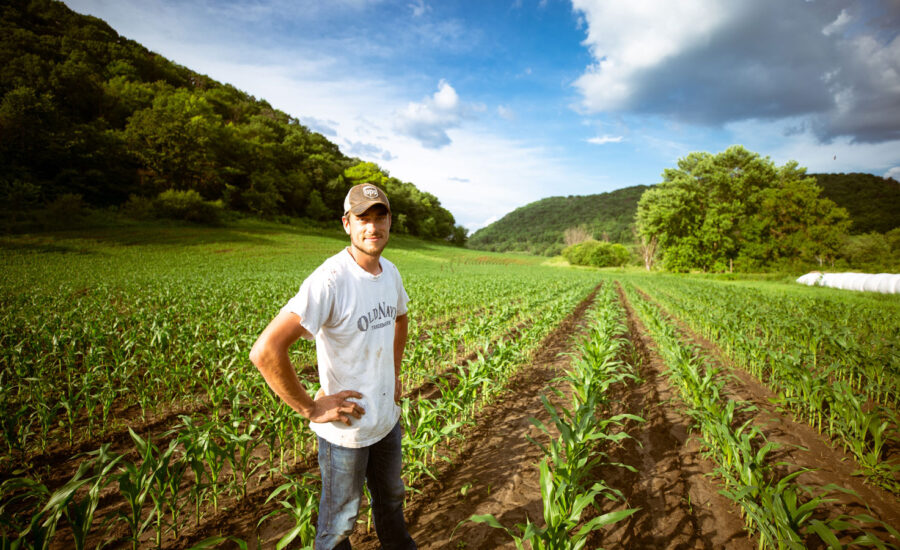Can you gift a farm to your kids to avoid taxes?
The idea to gift property to a family member for a dollar to avoid tax is a common one. But can this be done in reality?
Advertisement
The idea to gift property to a family member for a dollar to avoid tax is a common one. But can this be done in reality?

What could I expect from CRA if I were to sell my $2-million property for $1 to one of my three farming sons to avoid paying capital gains tax?
I purchased property myself in 1968, and only paid $2. Sold in 2022 for $1.
I have been using the land for hay and have had a few beef cattle for 20-plus years.
—Richard
Depending upon whether you have a home on your farm, Richard, will have an impact on my answer.
If you live on the farm, it may qualify as your principal residence and will be tax-free upon transfer, sale or death. This assumes you have ordinarily inhabited the property and have not claimed a principal residence exemption in the past for another property since you acquired it.
In order to claim a full principal residence exemption from tax, a property must typically be less than one-half hectare. For a larger property to qualify, the excess land must be “necessary for the housing unit to properly fulfill its function as a residence and not simply be desirable,” according to the Canada Revenue Agency (CRA). “Generally, the use of land in excess of one-half hectare in connection with a particular recreation or lifestyle (such as for keeping pets or for country living) does not mean that the excess land is necessary for the use and enjoyment of the housing unit as a residence.”
A common exception to the half-hectare rule is when a home is located on a property where the excess land is necessary to access public roads. Another is if there was a minimum lot size in a municipality when the property was purchased.
If your principal residence is on land used in a farming business, Richard, there are two methods for dealing with the disposition for capital gains tax purposes.
When you gift any asset to a family member, the transaction is generally deemed to take place at the fair market value, whatever value—$1 or otherwise—you apply to the transaction. Gifting may negate the land transfer tax for the municipality, province or territory, but you should seek local advice from your real estate lawyer.
There is a $1 million lifetime capital gains exemption for qualified farm properties, Richard. A qualified farm property includes any of the following:
It should be noted that the rules for qualified farm properties became stricter after 1987, but in your case, Richard, the property must have been used principally for farming in the year of disposition or at least five years during the period you owned it.
You acquired the property in 1968 when capital gains tax did not apply in Canada. Capital gains became taxable in 1972, so your ACB would be the fair market value at that time.
There was also a $100,000 lifetime capital gains exemption that taxpayers could claim on any assets up until 1994. Many taxpayers elected to claim notional capital gains at that time to bump up their tax cost, so that may also increase your ACB.
If part of the property value is still taxable, Richard, you may also be able to defer the tax until your child sells the property. This deferral is allowed as long as that child is a Canadian resident and the property “has been used in the business in which you, your spouse or common-law partner, or any of your children were actively engaged on a regular and ongoing basis before the transfer,” according to the CRA.
In summary, it may not be necessary to gift the property to one of your children to avoid capital gains tax, Richard. There may not be tax payable due to the principal residence exemption, the $100,000 lifetime capital gains exemption from 1994, and the current $1 million qualified farm property lifetime capital gains exemption.
Anyone considering gifting an asset to a child should also consider the risks of giving up control of that asset, especially if they might need it in the future. A principal residence is a great example!
You also have three kids, Richard, and gifting the property to only one of them could have implications for your estate planning if you want to ensure the other two are made whole and do not have other assets to do so.
Jason Heath is a fee-only, advice-only Certified Financial Planner (CFP) at Objective Financial Partners Inc. in Toronto. He does not sell any financial products whatsoever.
Share this article Share on Facebook Share on Twitter Share on Linkedin Share on Reddit Share on Email
I have 60 acres of straight farmland (no house) that we have been renting to a farmer for crops at set price per year. My husband and myself have been doing that since 2008. Thinkings of selling. Do we qualify for the million dollar capital tax exemption?
Due to the large volume of comments we receive, we regret that we are unable to respond directly to each one. We invite you to email your question to [email protected], where it will be considered for a future response by one of our expert columnists. For personal advice, we suggest consulting with your financial institution or a qualified advisor.